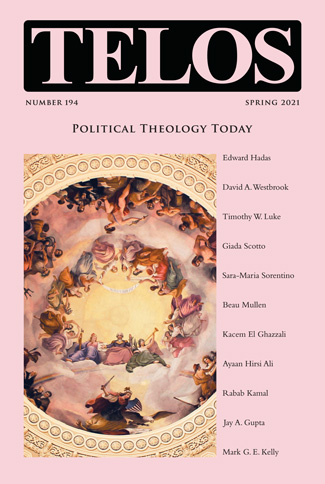 Concerns about inflation can lead us to exaggerate the role of money in the economy. In his essay on “Three Rival Versions of Monetary Enquiry,” in Telos 194, Edward Hadas argues that money is not at the center of economics. Instead, economics is fundamentally about what he calls the “Great Exchange,” in which people offer labor that changes the world and the world in return provides gifts to people in the form of goods and services. At its basis, this exchange involves the relationship between humans and nature, as well as the ways in which humans decide to manage this relationship. Though it can go on with or without money, money is very useful for managing the individual elements of the Great Exchange. As the mediator of the details of the Great Exchange, money is in fact neutral, neither a nefarious underminer of human relations nor a key to prosperity. For Hadas, economics is not in fact a quantitative discipline. The qualitative decisions about labor and consumption are the fundamental ones, which money then mirrors in a quantitative way through wages and prices. The moral and social decisions that money mediates, not the money itself, are the fundamental determiners of our economic condition. Russia, for instance, has seen that $300 billion in foreign reserves suddenly became unusable once it invaded Ukraine, and the foreign holders of those reserves froze them due to politically and morally based decisions. The decisions are primary, and the monetary consequences are merely the implementation of those decisions. Similarly, inflation is the effect of a series of decisions that are then reflected in prices. The refusal to import Russian oil, the decision to pay workers during the pandemic who were not working, the shortages resulting from pandemic shifts in spending habits, and the shifting of our energy sources in reaction to climate change have all contributed to inflation. In addition, asset price inflation resulted from the decision to maintain low interest rates even though borrowers during the pandemic did not have access to the labor and raw materials necessary for new investments. Rather, borrowing could only be used to purchase existing assets, increasing their monetary value without leading to increased production.
Concerns about inflation can lead us to exaggerate the role of money in the economy. In his essay on “Three Rival Versions of Monetary Enquiry,” in Telos 194, Edward Hadas argues that money is not at the center of economics. Instead, economics is fundamentally about what he calls the “Great Exchange,” in which people offer labor that changes the world and the world in return provides gifts to people in the form of goods and services. At its basis, this exchange involves the relationship between humans and nature, as well as the ways in which humans decide to manage this relationship. Though it can go on with or without money, money is very useful for managing the individual elements of the Great Exchange. As the mediator of the details of the Great Exchange, money is in fact neutral, neither a nefarious underminer of human relations nor a key to prosperity. For Hadas, economics is not in fact a quantitative discipline. The qualitative decisions about labor and consumption are the fundamental ones, which money then mirrors in a quantitative way through wages and prices. The moral and social decisions that money mediates, not the money itself, are the fundamental determiners of our economic condition. Russia, for instance, has seen that $300 billion in foreign reserves suddenly became unusable once it invaded Ukraine, and the foreign holders of those reserves froze them due to politically and morally based decisions. The decisions are primary, and the monetary consequences are merely the implementation of those decisions. Similarly, inflation is the effect of a series of decisions that are then reflected in prices. The refusal to import Russian oil, the decision to pay workers during the pandemic who were not working, the shortages resulting from pandemic shifts in spending habits, and the shifting of our energy sources in reaction to climate change have all contributed to inflation. In addition, asset price inflation resulted from the decision to maintain low interest rates even though borrowers during the pandemic did not have access to the labor and raw materials necessary for new investments. Rather, borrowing could only be used to purchase existing assets, increasing their monetary value without leading to increased production.
Yet money does matter if understood as something that is not simply a medium of exchange. The difference between wages and prices for goods and services on the one hand and asset values on the other hand indicates a difference between two kinds of money for Hadas. If the former, which he designates as token-money, does not have an independent moral and social significance, the latter, which he terms treasure-money, does have such significance. Treasure-money, which once consisted of land as well as the jewels and precious objects of royal treasuries, now consists of the different types of assets that are included in savings and investments. Ultimately, treasure-money represents our attempt to resist the forces of time. As opposed to token-money, treasure-money does matter in that it allows us to manage our own mortality as well as our relationship to future generations. Consequently, our capabilities and decision-making in relation to treasure-money become a major source of social and political conflict. These questions, and economics in general, must be understood as inseparable from our broader conceptions of meaning for ourselves and the collectives to which we belong.
Read Edward Hadas’s “Three Rival Versions of Monetary Enquiry: The Ideologies of Money,” from Telos 194, at the Telos Online website (subscription required). If your library does not yet subscribe to Telos, visit our library recommendation page to let them know how.








